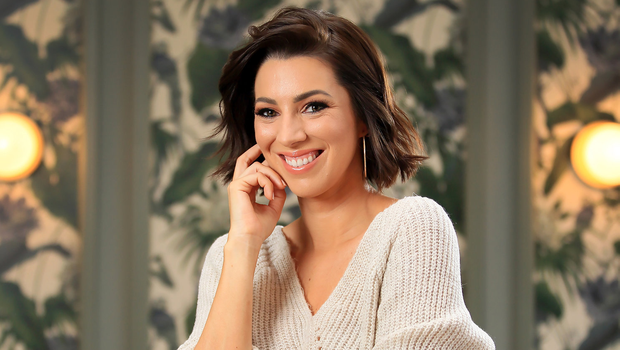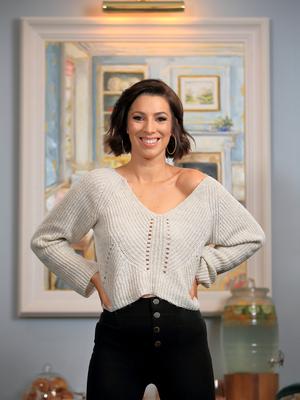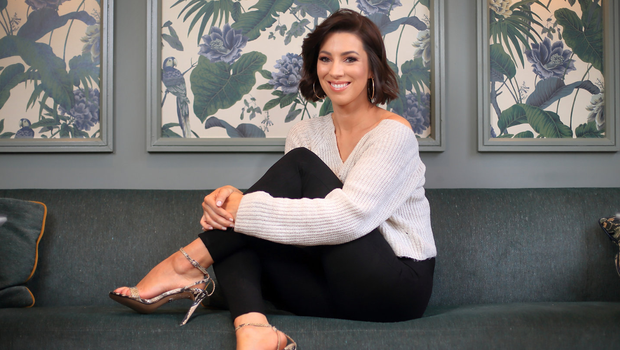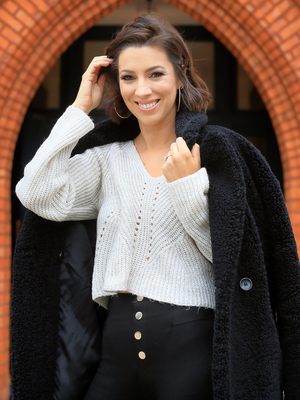‘I’m back to short hair,” laughs Georgie Crawford, thumbing the end of her cropped ponytail but showing no sign of remorse at the loss of her long-haired wig. We are sitting in a quiet coffee shop in Dublin following her photo shoot. Dressed in pencil trousers, heels and a floaty white blouse – her short raven hair scraped back, emphasising those plush, outsized features – she cuts an elfin figure. But any impression of frailty is soon dispelled by her sunny disposition and obvious mettle.
his is a woman who has been to war and won, a woman whose life could easily have been perceived from the outside as a bed of roses. But, the last few years have contained the very best and worst of a life for Crawford. Getting married to her long-time love Jamie Crawford, moving into her dream home and the birth of her first child Pia in 2017 coincided with a breast cancer diagnosis that rocked her world, at just 32 years old.
“It felt like I was falling down a hole,” she pauses, looking away. “I remember the night vividly. It was October, Pia was seven months old and I had asked Jamie to do the night feed, as I was really tired and due to go back to work later that week. I rolled over in bed and felt this hard lump.”
A lot of healthy 32-year-olds might dismiss the notion of a malignant tumour, but Crawford knew in her gut something sinister was at play.
“I had this feeling that it was bad and when I grabbed my husband Jamie’s hand and saw the look on his face, I knew my gut was right.”
She was diagnosed with stage-two breast cancer the following week and underwent two surgeries, chemotherapy and radiotherapy; it was bleak and overwhelming. She remembers with painful clarity the effort involved in getting through each day.
“During the treatment I couldn’t cope with how enormous it was. The impact it could have on my life terrified me,” she admits.
There were days when her mum would call to see how she was to find her in a heap crying, shopping bags all over the floor, the house a mess.
“In the end, it was Jamie, my mum and Pia that really pushed me through. I had this beautiful baby to look after and Pia woke up with a big smile on her face every morning; I couldn’t cry in front of her. I didn’t want her to be privy to that, so every morning I forced a big smile on my face and I took her out for a walk. I just moved,” she says fiddling with the gold hoops in her ears. “Then I’d come home, put her down for a nap and sit in the back garden listening to the birds, that’s what got me through.”
She returned to work as entertainment editor at Spin FM following her treatment in October 2018 but found she was somewhat rudderless.
“Everything felt different,” she muses. “I was getting up at 5am to drive into town for work so not getting enough sleep and then finding myself crying in the toilets over some sad news story I’d heard; I just wasn’t the same.”
It was during this time, after receiving a message from an Instagram follower, that she was spurred to start The Good Glow podcast.
“My phone beeped one day while I was at work and it was a message from a woman in America who had been through cancer and went on to have three children. She told me I’d get through it and get my life back.”
It was a lightbulb moment, one that diffused the loneliness one can feel at a time of grief or despair.
“I thought how lucky I was to share my story and get this wonderful feedback that kept me going. It got me thinking about those people who don’t get to share their story and where they get their reassurance from.”
She went home that evening and announced to Jamie that she wanted to start a podcast that focused on wellness and allowed and encouraged people to talk openly about their problems.
“I’d told my story on TV and radio but six minutes isn’t enough,” she sighs, somewhat exasperated. “A podcast gives people an hour or more to tell their important story and for listeners to garner the information in the right way. It’s a really positive space.”
Originally launched in a bid to help people going through something difficult, her show has tapped into the wellness trend and in 15 months has reached a whopping three million downloads. What, I wonder, has made it stand out among the glut of podcasts in the wellness gold rush?
“My intention has always been to help people and I think I’ve stayed true to that. It’s real, it’s raw and it triggers ‘ah-ha’ moments; it makes people think about things differently or with more of an open mind.”
It’s true, she can credit the show and herself for encouraging a positive movement wave: people are booking appointments for smear tests, breast checks, engaging in counselling services and joining running clubs as a result of tuning in. Like Crawford, they are putting themselves higher on their to-do lists.
She describes The Good Glow as “her beating heart”, instinctively knowing when someone is “right” for it. Her first guest was presenter Doireann Garrihy, with whom she worked at Spin 1038 – a great friend to her when she was sick and a “good place to start”. What has followed has been roll call that runs the gamut of Irish celebrities and ‘survivors’: Pippa O’Connor Ormond, Donal Skehan, Lottie Ryan, Síle Seoige and leukemia survivor Ciaran Byrne – whether it’s someone who has overcome hardship, built a great brand or a wellness expert with advice to give, they all have a story to tell. “I soon realised that everyone is going through something and I think that’s why it’s connected with so many and become such a big part of people’s lives.”
There is something about Crawford that wrong-foots the very notion of an interview: she isn’t guarded, but surprisingly honest and self-deprecating and yet it’s worn with careful containment – a mix of vulnerability and sass born from pulling yourself up from your bootstraps. But then, it’s extraordinarily plucky to turn a vulnerable, private journey into reportage, her Good Glow podcast knitting her, and fellow survivors’, stories together with candidness and warmth.
It’s impossible to speak to Crawford without feeling as if you know her; she’s relatable and real. When she speaks her face is a film-roll of expression, those outsized features telegraphing emotion instantaneously, from sadness to smiles. The same could be said of her podcast: you’re invited into an open, honest conversation as though you were sitting across from her having a cup of tea.
And yet I wonder is there any regret in exposing her vulnerabilities in a fiercely competitive and judgmental industry? Her eyes widen.
“No,” she says emphatically. “In fact, it’s been a really positive experience and I feel very lucky and grateful for that.”
Then she pauses, recalling a time post-treatment when she struggled with shame and judgment.
“I had an issue with food after my diagnosis; I couldn’t eat anything bad around other people for fear they’d judge me. I was ashamed people might think I was unhealthy or had done something wrong,” she confesses. And did they?
“I didn’t experience that but they say you lose friends when you’ve cancer and I certainly did,” she says with a surprising lack of anger in her voice. “I don’t judge people who weren’t there for me when I was sick. They were doing what they thought was right and some drift away, that’s just life,” she adds philosophically. “I think it’s a gift to yourself not to judge.”
Crawford’s sagacious spirit seems equal parts nature, nurture and resilience but she’s quick to credit her year in counselling for her “good mental health” along with her new-found fitness. Running, she admits, “calms her down”. She takes better care of her health now, knowing she can’t take it for granted. In fact, it’s the most positive thing to come from her experience.
“It sounds selfish but I put myself very high up on my to-do list now,” she smiles. “I was always rushing, always in survival mode when I worked in radio. Now my own tank gets filled up first and that means I’ve more to give to the people around me.”
She’s enrolled in a mindfulness class every Monday evening and not even Pia’s pleading for “mummy to stay” will sway her from attending. The same shark-fin drive she has for her work is also applied to her health and wellbeing. In January ran 12km in the Swiss Alps with Jamie, something she never thought she’d do.
“I remember reaching the top of the mountain and looking around at the most amazing scenery. I’d been in the thick of chemotherapy two years previous so it was a really proud moment.” The journey is being made into a documentary that will be shared with her followers in the coming months.
Georgie’s ideal weekend is spent doing the Park Run with Jamie and Pia followed by a big family breakfast. Running has become part of her ‘new’ life which is why I’m surprised to learn she’s not very good at it.
“I’m not a natural athlete,” she says with a wry smile. An image of Phoebe from Friends, jogging like a maniac, springs to mind.
“I’m not that bad,” she laughs, “but I don’t find it easy.”
In an attempt to assuage her doubt I admit to ‘hating’ my spin classes despite feeling good after it.
“I dread putting my runners on,” she admits. “But, yes, you do feel amazing after it.”
Anything else she’s not good at? Social media, apparently. I’m not convinced; even without an empowering broadcast narrative, her fans would have found her thanks to her huge Instagram following (60,000 and growing) and yet she’s “still finding her way with it”.
“I don’t tend to overshare, it’s still daunting to me,” she says quietly, looking down, knitting her fingers together. I find this surprising, given the fact that in an age of hyper-filtered perfection she seems to wear her adversity and doubt with confidence.
“Nobody has a perfect life and people are more aware of that and becoming more real online and that’s a breath of fresh air,” she counters. “I suppose I’m more reluctant to share too much of Pia with the world.”
On the subject of being a mum, Crawford is animated, gushing about her three-year-old, grateful for every moment she gets with her, even if she’s having a meltdown in the middle of Dundrum shopping centre. And then she is quiet and when she looks up, her big eyes are misty with tears. “Sorry,” she says waving her hand in front of her face in an attempt to stop the tears. She is thinking of her own mum, her “hero”, and how important that relationship has been to her.
“I just want to be a mum for as long as I can be,” she says, wiping away tears. But there’s more to the tears: the threat of not being able to grow her family is a huge anxiety. Before her treatment began in December 2017 the couple decided to retrieve her eggs through IVF.
“On the plus side,” she says regaining her thread, “we were very lucky in that we had a six-week window from the time I finished my surgeries to when the chemo started to do a round of IVF and we got 15 embryos from that. Unfortunately, I’m still on a cocktail of drugs so I can’t begin that journey yet.”
Waiting on the results of scans has been one of the most challenging aspects of her experience but the thought of not being able to give Pia a sibling is the source of much of her anxiety. “It’s hard when you have a vision of what you want your life to be like and it doesn’t turn out the way you planned,” she shrugs. “I guess I have to trust the universe.”
Despite her hard-won resilience, it’s clear Crawford is less juggernaut toughness, more presence and peace. As guilty pleasures go, it’s a glass of Prosecco, a cheese board and dark chocolate, shared with friends at home. She likes to spend her money on “good food” and when I ask her whether she’d agree with what Sophie Sabbage, aka the ‘Cancer Whisperer’, once said about cancer being her “best teacher”, she’s philosophical.
“I absolutely agree with that,” she says. “I’m not a f*** cancer type of person anyway,” she laughs. “But I woke up with a certain amount of energy everyday, which, during chemo, wasn’t much and I had to decide where I wanted to put that energy – into hating or healing. I chose the latter.”
She has not gone to war with her illness, as such, but is learning from it. “It’s hard for me to say this but I don’t know if I’d change what’s happened because I live my life so differently now as a result of having breast cancer.”
And yet, she cites Jamie as the risk-taker in the relationship: he’s the ‘dream big’ to her ‘play it safe’ but it works. Former CEO of Lovin Dublin, he now works as a consultant and plays a huge role in The Good Glow. They are building a small team but, ultimately, it’s Georgie’s baby: she is the nuts and bolts, writing and editing content, researching and booking guests while Jamie thinks of the bigger picture.
On April 29, they will be doing a live version of The Good Glow at the National Concert Hall. This is off the back of a recent show in the Stella cinema in Rathmines that brought 200 guests to a communal singsong.
“I’m a terrible singer, but I love it,” she laughs. “That night was incredible, I just want people to leave with an appreciation of their lives. Jamie has helped me bring The Good Glow to another level.”
The pair met while they were both working at Spin FM, Georgie was part of the Spin promotions team while studying journalism at the Dublin Business School, taking up a position on the news team following her graduation. She was soon promoted to entertainment editor of Spin 1038, Spin South West and 98 FM until last year when she left her job in radio to focus on The Good Glow. Given her childhood weekends spent recording her own radio show with her brother Michael, it comes as no surprise she ended up where she is.
“I was always a good listener,” she muses. “I love meeting new people and hearing their stories and everyone has a story,” she smiles. I wonder who her dream guest would be.
“Oprah,” she answers without hesitation. “She wasn’t really on my radar until I got cancer but her book changed my relationship with my illness. Her words gave me so much strength and really got me through the dark days.”
Closer to home she’s hoping Samantha Barry, editor of the US edition of Glamour magazine, and Ciaran Byrne might return for the live show.
“He has an incredible story and I just found it so inspiring – the way he danced and sang his way through his treatment; that’s the power of positive thinking.”
Takes one to know one. She shrugs, that’s what happens when you’ve walked through the fire and proved to yourself that you could do it all again if you had to. Quite simply, she knows what’s important.
“I try to live as much in the now as I possibly can. I eat well, I sleep properly, I look after my body. I’m positive and happy but it took me a while to get there. If I had to give any advice it would be to give yourself the gift of time, and remember, the sun always comes out again.”
Irish Independent




